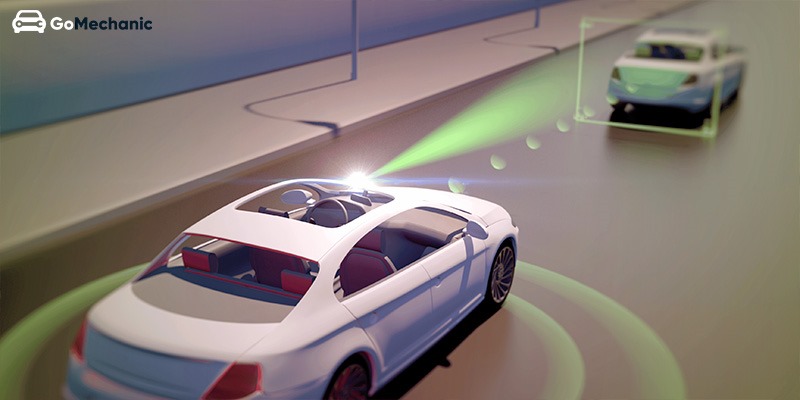Artificial Intelligence (AI) and Machine Learning (ML) are not just buzzwords in the tech world; they are revolutionizing industries far and wide. Among these, the automotive industry stands out as a prime beneficiary of these technological marvels. The impact of AI on automotive industry is profound, with advancements reaching from the factory floor to the open road. In this blog, we’ll dive into how AI and ML are reshaping automotive technology, making vehicles smarter, safer, and more efficient.
The Driving Force Behind Innovation
The automotive sector’s embrace of AI and ML signifies a leap towards innovation, emphasizing the significant benefits of AI in the automotive industry. These technologies have become the backbone of modern vehicle design and manufacturing, enabling a new era of smart vehicles that understand and adapt to their environment.
Read More: Self Driving Cars in India
Revolutionizing Manufacturing with the Impact of AI on Automotive Industry

Benefits of AI in automotive industry isn’t just localized to robots assembling parts; it’s also about creating an ecosystem of smart manufacturing. AI-driven robots handle welding, painting, and assembly, enhancing efficiency and reducing the margin for error. Quality control has also seen a leap forward with AI systems capable of detecting defects that would be invisible to the human eye. This revolution in manufacturing underlines the critical role of machine learning for the automotive industry.
Autonomous Vehicles: The Future is Now
One of the most talked-about impact of AI on automotive industry is the development of autonomous vehicles. Self-driving cars, once a fixture of science fiction, are now becoming a reality thanks to AI and ML. These technologies enable vehicles to make real-time decisions, navigate complex environments, and ensure passenger safety with minimal human intervention. The push towards autonomous driving is not just about convenience but also about significantly reducing accidents caused by human error.
Enhancing Safety and Experience
AI doesn’t stop at autonomous driving; it extends to enhancing safety features and the driving experience. Advanced driver-assistance systems (ADAS), such as lane departure warnings and adaptive cruise control, rely on AI to provide real-time assistance and alerts. Meanwhile, in-cabin monitoring systems ensure the driver’s attention remains on the road, reducing the risk of accidents due to distraction or drowsiness.
- Predictive Maintenance: AI uses vehicle data to predict maintenance needs, reducing downtime and repair costs.
- Personalized Driving Experience: AI-powered systems tailor the driving experience to individual preferences, adjusting settings for optimal comfort and enjoyment.
Transforming Retail and Aftermarket Services
AI’s impact extends beyond vehicle manufacturing and into retail and aftermarket services. Virtual showrooms and AI-driven chatbots offer customers a seamless shopping experience, while predictive analytics helps dealerships manage inventory and tailor their offerings to consumer preferences. In the service department, AI enables more accurate diagnostics and predictive maintenance, ensuring vehicles remain in top condition while minimizing costs.
Navigating Challenges and Roadblocks

While the impact of AI on automotive industry is overwhelmingly positive, the journey towards full integration is paved with several challenges. Here are some key obstacles and the industry’s efforts to navigate them:
- Safety Concerns: Ensuring AI systems can handle real-world driving scenarios safely is paramount. There’s a continuous push to improve AI’s decision-making capabilities under diverse and unpredictable conditions.
- Ongoing development of more sophisticated simulation environments to train AI under various conditions.
- Enhanced sensor technologies to improve the detection and interpretation of environmental data.
- Regulatory Hurdles: The automotive industry faces a complex web of regulations that vary by country and region. AI integration intensifies this complexity, particularly for autonomous vehicles.
- Active engagement with regulatory bodies to develop standards and guidelines for AI in automotive.
- Pilot programs in partnership with governments to showcase the technology’s safety and reliability.
- Data Privacy: The collection and use of data for training AI systems raise privacy concerns.
- Implementation of robust data protection measures to secure user data.
- Transparency with users about how their data is used and offering opt-out options where feasible.
- Cybersecurity Risks: As cars become more connected, they are more susceptible to cyber-attacks.
- Development of advanced cybersecurity frameworks to protect against threats.
- Regular software updates and patches to address vulnerabilities.
Read More: Why Sharing is Caring for Rival Carmakers?
The Road Ahead
The future of automotive technology is undoubtedly AI-driven, with machine learning playing a pivotal role in shaping this future. As we move towards a world where vehicles are not just modes of transport but intelligent companions, the possibilities seem limitless.
- 5G and AI Collaboration: The advent of 5G technology promises to enhance AI’s capabilities in automotive, enabling more efficient vehicle-to-everything (V2X) communication and paving the way for more advanced autonomous driving features.
- AI in Operations: Beyond manufacturing, AI optimizes sales, customer service, and logistics, streamlining operations and improving efficiency across the board.
The impact of AI on automotive industry is a testament to the transformative power of technology. As AI and ML continue to evolve, we can expect even greater advancements that will redefine our relationship with automobiles. The journey towards smarter, safer, and more personalized vehicles is just beginning, and the road ahead looks promising indeed.





